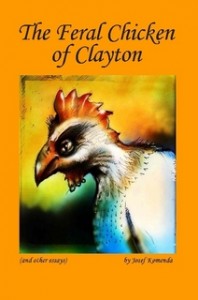
IT WAS IN THE SPRING, while upon my daily commute, that I began to notice a peculiar sort of atmospheric disturbance. It seemed to be snow, but the time of year and region (North Carolina – the Tar Heel State) dictated that this could not be. Onward I drove, and the ‘snow’ seemed to increase, until at last I seemed in a veritable blizzard. Only then did I realize my error – I was driving behind a chicken truck!
I had been steadily gaining on the truck for some time, but had been so absorbed by the odd situation that I could not properly adjust my frame of reference. Now, however, I had ample opportunity to observe. It was a normal sized semi tractor trailer – an ’18 wheeler’. The bed of the truck was flat and consisted of several very large palettes, each of which contained many small cages, stacked very high, with about a dozen chickens per cage. They (the chickens) were white, and decidedly fat. They were undoubtedly bound for the dinner table. Adding insult to injury, they were being buffeted by the winds on the freeway. I resolved to be more circumspect the next time I ate poultry.
Perhaps a month later, I was again hurtling towards the perils of the city via the freeway, when my progress was abruptly impeded by a blockade of cars. A traffic jam. “An accident” I said to myself, “Probably on that dangerous overpass.”
In fact, I was correct. A tractor trailer had overturned, apparently while attempting to merge with traffic. It seemed, as I approached, that there were no injuries to the driver or lesser vehicles, however, there was again the odd snow-like atmosphere in abundance. A chicken truck had overturned! There were, in fact, many a chicken walking about at the scene. The similarities in posture and confusion to the humans walking about at the scene would perhaps embarrass both bird and man, so of it I will say no more.
At that moment, an odd idea flitted through my mind, as quickly as a feather across my windshield. I knew that the dazed birds could only peck at the side of the road. I knew responsible parties would come and gather their damaged and slightly discommoded foul, and place them in another vehicle, and speed them to their doom. It was only a comfort to my mind that brought the word, the idea, that was escape. I changed lanes, glanced in my mirror, and thought of it no more.
That weekend I was upon the same overpass, utilized the offramp thereof, to take the back road into town. When suddenly, my eye caught a glimpse of something in the brush. I turned my head, and saw that in the scrubby wooded area next to the offramp, there were several chickens! Amazing! A Wonder! Escapees! I drove on in a rapture, delighted that the stout-hearted Gallus Gallus had managed to avoid capture for a time. Only later, upon reflection, did I realize how short their time would be. The traffic, predators and people would soon bring the new-found freedom to a painful end, but Oh, for the moment of glory!
I thought no more of chickens for several months, seeing neither wing nor truck, and confining myself to the task of commuting and working, and of letting my mind wander freely while I drove. The winter had come and gone, and I had occasion to take the back roads only rarely. Yet, when I did take the back roads, ever did I let my glance linger on the scrubby brush, wondering. What was the fate of the chickens?
And then, in the spring, I saw him. Standing in the clearing, with the shadowy forms of his flock behind him, he was revealed to me in his glory. The Feral Chicken of Clayton. A majestic bird – white and lean, and as proud a posture as Frank Purdue could ever produce. The mystery of the loose chickens’ fate had been solved. This then, was the rooster who had led the hens to safety, who saw the opportunity, who seized it, and who lived in the fallow offerings of mankind with pride, and strength, and beauty, asking no quarter, and giving none in return. What lowly fox or possum would dare defile the perfect wattles? His comb, like a crown, stood tall, and was as heraldry to his hens. I was humbled before him, and nearly drove my truck into the ditch.
That was the last time I saw the Feral Chicken of Clayton. Though it may well be that he and his flock met their untimely end at the jaws of some low creature, or man, I prefer to think that they yet live, and that they found their niche in the pseudo-natural setting of the urban landscape. Often I wonder, how many of us could escape from our fate – if ever we knew our fate? The Chicken offers us hope – that even those humble creatures whose lives are written, and their days numbered from birth to death, may yet become alive in the minds of others, and live on, even if only in a story.
The story of a Chicken.
~Joe Komenda
[Chapter 2 of The Feral Chicken of Clayton (and other essays)]